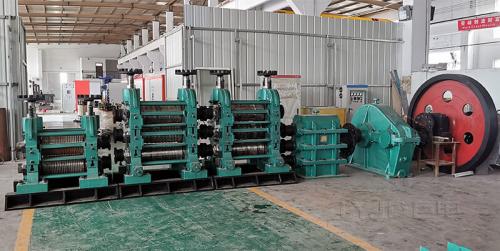Sustainability and Environmental Impact of the Rebar Rolling Production Line

The
sustainability and environmental impact of a rebar rolling production line can
be assessed in several key areas.
Energy
Efficiency
Energy
consumption is a significant factor in the environmental impact of a rebar
rolling production line. Implementing energy-efficient technologies such as
energy-efficient motors, variable frequency drives (VFDs), and optimized motor
control systems can reduce energy consumption during the rolling process. This
leads to lower greenhouse gas emissions and contributes to a more sustainable
operation.
Waste
Management
Proper waste
management practices are essential to minimize the environmental impact of a
rebar rolling production line. This includes effective management of metal
scrap generated during the rolling process. Implementing recycling and waste
reduction strategies can help minimize the amount of waste sent to landfills
and conserve natural resources.
Water Usage
Water is often
used for cooling purposes in the rebar rolling process. Implementing water
management strategies, such as recycling and reusing water, can minimize water
consumption and reduce the strain on local water resources. Additionally,
adopting water treatment technologies can help mitigate any potential
environmental impact associated with water discharge.
Emissions
Control
The rebar
rolling process may involve the release of emissions, including particulate
matter, gases, and volatile organic compounds (VOCs). Employing effective
emissions control measures, such as exhaust ventilation systems and air
pollution control technologies, can help mitigate the environmental impact and
ensure compliance with local environmental regulations.
Materials
and Resource Efficiency
Maximizing
resource efficiency is crucial for sustainable rebar rolling production. This
includes optimizing material utilization to minimize waste, promoting the use
of recycled steel, and employing resource-efficient design principles.
Additionally, implementing lean manufacturing practices can help reduce
material waste, energy consumption, and environmental impact.
Environmental
Compliance
Adhering to
environmental regulations and standards is essential for sustainable
operations. Ensuring compliance with local environmental laws, obtaining
necessary permits, and regularly monitoring and reporting environmental
performance are vital aspects of minimizing the environmental impact of a rebar
rolling production line.
Lifecycle
Assessment
Conducting a
lifecycle assessment (LCA) provides a comprehensive evaluation of the
environmental impact of a rebar rolling production line. An LCA considers the
entire lifecycle of the process, from raw material extraction to end-of-life
disposal or recycling. It helps identify areas of improvement, prioritize
sustainability initiatives, and make informed decisions to minimize the overall
environmental footprint.
Continuous
Improvement and Innovation
Encouraging a
culture of continuous improvement and innovation within the rebar rolling
production line can drive sustainability. Regularly evaluating processes,
technologies, and practices, and seeking opportunities for improvement, helps
identify more sustainable alternatives and reduces the environmental impact
over time.
By addressing
these aspects of sustainability, a rebar rolling production line can minimize
its environmental footprint, conserve resources, and contribute to a more
sustainable and responsible steel industry.
Post Your Ad Here
Comments